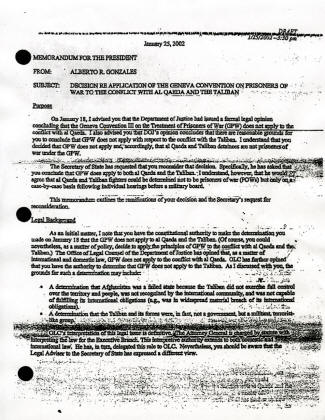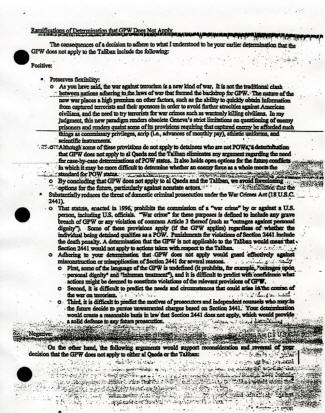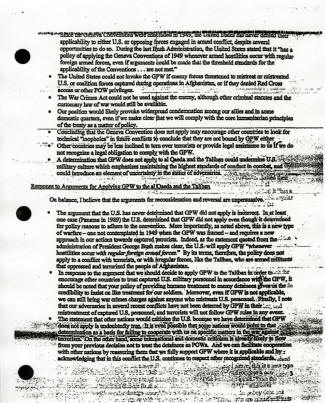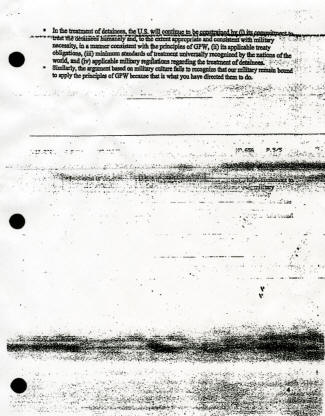|
MEMO 7
DRAFT
1/25/2002-3:30 pm
January 25, 2002
MEMORANDUM FOR THE
PRESIDENT
FROM: ALBERTO
R. GONZALES
SUBJECT:
DECISION RE APPLICATION OF THE GENEVA CONVENTION ON PRISONERS OF WAR TO
THE CONFLICT WITH AL QAEDA AND THE TALIBAN




Purpose
On January 18, I
advised you that the Department of Justice had issued a formal legal
opinion concluding that the Geneva Convention III on the Treatment of
Prisoners of War (GPW) does not apply to the conflict with al Qaeda.
I also advised you that DOJ's opinion concludes that there are
reasonable grounds for you to conclude that GPW does not apply with
respect to the conflict with the Taliban. I understand that you
decided that GPW does not apply and, accordingly, that al Qaeda and
Taliban detainees are not prisoners of war under the GPW.
The Secretary of
State has requested that you reconsider that decision.
Specifically, he has asked that you conclude that GPW does apply to both
al Qaeda and the Taliban. I understand, however, that he would
agree that al Qaeda and Taliban fighters could be determined not to be
prisoners of war (POWs) but only on a case-by-case basis following
individual hearings before a military board.
This memorandum
outlines the ramifications of your decision and the Secretary's request
for reconsideration.
Legal
Background
As an initial
matter, I note that you have the constitutional authority to make the
determination you made on January 18 that the GPW does not apply to al
Qaeda and the Taliban. (Of course, you could nevertheless, as a matter
of policy, decide to apply the principles of GPW to the conflict with al
Qaeda and the Taliban.) The Office of Legal Counsel of the
Department of Justice has opined that, as a matter of international and
domestic law, GPW does not apply to the conflict with al Qaeda.
OLC has further opined that you have the authority to determine that GPW
does not apply to the Taliban. As I discussed with you, the
grounds for such a determination may include:
-
A determination
that Afghanistan was a failed state because the Taliban did not
exercise full control over the territory and people, was not
recognized by the international community, and was not capable of
fulfilling its international obligations (e.g., was in widespread
material breach of its international obligations).
-
A determination
that the Taliban and its forces were, in fact, not a government, but
a militant, terrorist-like group.
OLC's interpretation
of this legal issue is definitive. The Attorney General is charged
by statute with interpreting the law for the Executive Branch.
This interpretive authority extends to both domestic and international
law. He has, in turn, delegated this role to OLC.
Nevertheless, you should be aware that the Legal Adviser to the
Secretary of State has expressed a different view.
Ramifications
of Determination that GPW Does Not Apply
The consequences of
a decision to adhere to what I understood to be your earlier
determination that the GPOW does not apply to the Taliban include the
following:
Positive:
- Preserves flexibility:
-
As you have
said, the war against terrorism is a new kind of war. It
is not the traditional clash between nations adhering to the
laws of war that formed the backdrop for GPW. The nature
of the new war places a high premium on other factors, such as
the ability to quickly obtain information from captured
terrorists and their sponsors in order to avoid further
atrocities against American civilians, and the need to try
terrorists for war crimes such as wantonly killing civilians.
In my judgment, this new paradigm renders obsolete Geneva's
strict limitations on questioning of enemy prisoners and renders
quaint some of its provisions requiring that captured enemy be
afforded such things as commissary privileges, script (i.e.,
advances of monthly pay), athletic uniforms, and scientific
instruments.
-
Although
some of these provisions do not apply to detainees who are not
POWs, a determination that GPW does not apply to al Qaeda and
the Taliban eliminates my argument regarding the need for
case-by-case determinations of POW status. It also holds
open options for the future conflicts in which it may be more
difficult to determine whether an enemy force as a whole meets
the standard for POW status.
-
By
concluding that GPW does not apply to al Qaeda and the Taliban,
we avoid foreclosing options for the future, particularly
against nonstate actors.
- Substantially reduces the threat of domestic
criminal prosecution under the War Crimes Act (18 U.S.C. 2441).
-
That
statute, enacted in 1996, prohibits the commission of a "war
crime" by or against a U.S. person, including U.S. officials.
"War crime" for these purposes is defined to include any grave
breach of GPW or any violation of common Article 3 thereof (such
as "outrages against personal dignity"). Some of these
provisions apply (if the GPW applies) regardless of whether the
individual being detained qualifies as a POW. Punishments
for violations of Section 2441 include the death penalty.
A determination that the GPW is not applicable to the Taliban
would mean that Section 2441 would not apply to actions taken
with respect to the Taliban.
-
Adhering to
your determination that GPW does not apply would guard
effectively against misconstruction or misapplication of Section
2441 for several reasons.
-
First,
some of the language of the GPW is undefined (it prohibits,
for example, "outrages upon personal dignity" and "inhuman
treatment"), and it is difficult to predict with confidence
what actions might be deemed to constitute violations of the
relevant provisions of GPW.
-
Second,
it is difficult to predict the needs and circumstances that
could arise in the course of the war on terrorism.
-
Third,
it is difficult to predict the motives of prosecutors and
independent counsels who may in the future decide to pursue
unwarranted charges based on Section 2441. Your
determination would create a reasonable basis in law that
Section 2441 does not apply, which would provide a solid
defense to any future prosecution.
Negative:
On the other hand,
the following arguments would support reconsideration and reversal of
your decision that the GPW does not apply to either al Qaeda or the
Taliban:
-
Since the Geneva
Conventions were concluded in 1949, the United States has never
denied their applicability to either U.S. or opposing forced engaged
in armed conflict, despite several opportunities to do so.
During the last Bush Administration, the United States tated that it
"has a policy of applying the Geneva Conventions of 1949 whenever
armed hostilities occur with regular foreign armed forces, even if
arguments could be made that the threshold standards for the
applicability of the Conventions ... are not met."
-
The United
States could not invoke the GPW if enemy forces threatened to
mistreat or mistreated U.S. or coalition forces captured during
operations in Afghanistan, or if they denied Red Cross access or
other POW privileges.
-
The War Crimes
Act could not be used against the enemy, although other criminal
statutes and the customary law of war would still be available.
-
Our position
would likely provoke widespread condemnation among our allies and in
some domestic quarters, even if we make clear that we will comply
with the core humanitarian principles of the treaty as a matter of
policy.
-
Concluding that
the Geneva Convention does not apply may encourage other countries
to look for technical "loopholes" in future conflicts to conclude
that they are not bound by GPW either.
-
Other countries
may be less inclined to turn over terrorists or provide legal
assistance to us if we do not recognize a legal obligation to comply
with the GPW.
-
A determination
that GPW does not apply to al Qaeda and the Taliban could undermine
U.S. military culture which emphasizes maintaining the highest
standards of conduct in combat, and could introduce an element of
uncertainty in the status of adversaries.
Response to
Arguments for Applying GPW to the al Qaeda and the Taliban
On balance, I
believe that the arguments for reconsideration and reversal are
unpersuasive.
-
The argument
that the U.S. has never determined that GPW did not apply is
incorrect. In at least one case (Panama in 1989) the U.S.
determined that GPW did not apply even though it determined for
policy reasons to adhere to the convention. More importantly,
as noted above, this is a new type of warfare -- one not
contemplated in 1949 when the GPW was framed -- and requires a new
approach in our actions towards captured terrorists. Indeed,
as the statement quoted from the administration of President George
Bush makes clear, the U.S. will apply GPW "whenever hostilities
occur with regular foreign armed forces." By its terms,
therefore, the policy does not apply to a conflict with terrorists,
or with irregular forces, like the Taliban, who are armed militants
that oppressed and terrorized the people of Afghanistan.
-
In response to
the argument that we should decide to apply GPW to the Taliban in
order to encourage other countries to treat captured U.S. military
personnel in accordance with the GPW, it should be noted that your
policy of providing humane treatment to enemy detainees gives us the
credibility to insist on like treatment for our soldiers.
Moreover, even if GPW is not applicable, we can still bring war
crimes charges against anyone who mistreats U.S. personnel.
Finally, I note that our adversaries in several recent conflicts
have not been deterred by GPW in their mistreatment of captured U.S.
personnel, and terrorists will not follow GPW rules in any event.
-
The statement
that other nations would criticize the U.S. because we have
determined that GPW does not apply is undoubtedly true. It is
even possible that some nations would point to that determination as
a basis for failing to cooperate with us on specific matters in the
war against terrorism. On the other hand, some international
and domestic criticism is already likely to flow from your previous
decision not to treat the detainees as POWs. And we can
facilitate cooperation with other nations by reassuring them that we
fully support GPW where it is applicable and by acknowledging that
in this conflict the U.S. continues to respect other recognized
standards
-
In the treatment
of detainees, the U.S. will continued to be constrained by (i) its
commitment to treat the detainees humanely and, to the extent
appropriate and consistent with military necessity, in a manner
consistent with the principles of GPW, (ii) its applicable treaty
obligations, (iii) minimum standards of treatment universally
recognized by the nations of the world, and (iv) applicable military
regulations regarding the treatment of detainees.
-
Similarly, the
argument based on military culture fails to recognize that our
military remain bound to apply the principles of GPW because that is
what you have directed them to do.
Go to Next Page |



